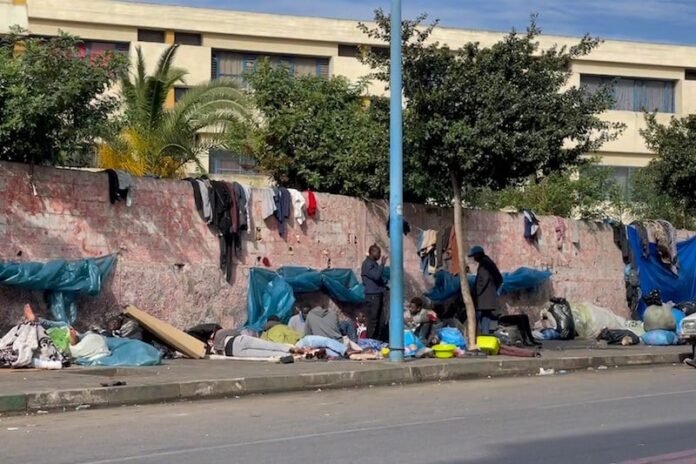By: Taha Riazi — Student of Law and Political Science, University of Bordeaux, France
On a bustling Moroccan summer along ports and roads, one can observe abandoned luggage on city quays and faces carrying the same story: a journey in search of safety, opportunity, and a better life. At this moment, Morocco is confronted with a crucial question: how can it manage the growing influx of migrants from Sub-Saharan Africa without compromising its sovereignty or humanitarian values?
This question is not merely a debate for social media; it is existential, touching the very identity of the state, its borders, and its ability to maintain demographic and cultural balance.
The Challenge Between the Classical Definition of the State and Moral Duty
According to political philosophy, the state is the entity that holds the monopoly on legitimate violence, protects its borders, and preserves the identity of its people, without shirking its moral duty toward the most vulnerable.
Here lies Morocco’s challenge: how to reconcile the protection of national security and citizens’ interests with welcoming the needy and treating refugees with dignity?
International law, through the 1951 Geneva Convention and the 1967 Protocol, grants states the right to regulate migration, while also imposing the duty to protect asylum seekers. Reality shows that the balance between these principles requires a clear strategic vision and effective implementation, otherwise social and economic pressures will escalate rapidly.
Demographic and Economic Pressure: From Indicator to Challenge
The 2024 report of Morocco’s High Commission for Planning reveals that the country hosts tens of thousands of migrants, mostly from Sahel countries. According to the International Organization for Migration (IOM), the number of Sub-Saharan residents in Morocco has increased by 38% over the past five years.
📊 International Comparative Table (2024)
| Country | Percentage % | Key Observations |
|---|---|---|
| Morocco | 1.1% | Transit and temporary or permanent residence |
| Spain | 2.3% | Relatively strong integration system |
| France | 3.8% | Integration challenges in suburban areas |
| South Africa | 4.2% | Social tensions and violence against foreigners |
This influx puts pressure on infrastructure and essential services such as housing, healthcare, and education, especially in transit cities like Tangier and Nador.
The question arises: do Moroccan cities have proactive plans to manage these pressures before they turn into social crises?
Lessons from International Experiences
-
France: Adopted an open humanitarian discourse in the 1980s and 1990s, but the lack of effective integration policies produced marginalized generations, caught between two cultures and geographically isolated.
-
Spain: Local integration programs linking residency, employment, and education reduced social tensions, requiring strong political will and continuous follow-up.
-
South Africa: Poor planning and communication on migration led to violent tensions, as local populations found themselves competing for scarce resources.
Morocco is in a delicate position: its economic capacities are weaker than France and Spain, and its social structure is more fragile in the face of sudden demographic shocks.
Toward a Comprehensive Migration and Asylum Law
Taha Riazi proposes drafting a framework law on migration and asylum balancing:
-
National security protection through regulated entry and border control.
-
Preservation of human dignity for migrants and refugees within a clear legal framework.
-
Selective integration of eligible individuals according to labor market needs.
-
Return of non-eligible individuals within cooperation agreements with countries of origin.
📈 Proposed Chart: Evolution of regular and irregular migrants in Morocco (2015–2024) with geographic distribution.
Thought-provoking question: Can Morocco create a unique model in Africa that reconciles human dignity with national interest?
The Existential Equation
As Jean-Jacques Rousseau said: “The people who renounce part of their sovereignty renounce themselves.”
Today, Morocco is called upon to demonstrate its ability to protect its territory without sacrificing its humanity, drawing on its history as a bridge between Africa and Europe and its legacy in balancing moral duty and sovereign rights.
The ultimate question remains: will the Kingdom take bold steps today to become a model of balance between humanity and sovereignty, or will it yield under the pressure of demographic challenges?




